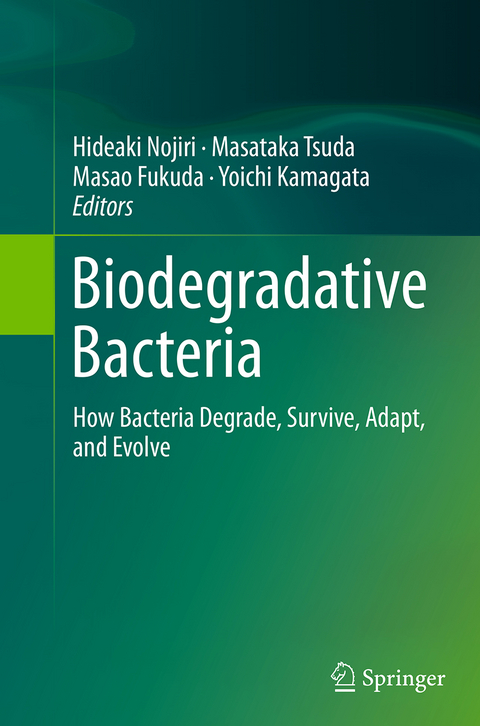
Biodegradative Bacteria
Springer Verlag, Japan
978-4-431-56134-7 (ISBN)
Bacterial metabolic capacity, which plays an important role in the global material cycle, contributes significantly to the buffering capacity for the huge and unintended release of various chemicals. Recently, however, the prosperity and globalization of material civilization has led not only to severe local contamination by hazardous chemicals, but also to continuous increment of contaminant concentrations worldwide. To solve such urgent global issues, bacterial functions that are involved in biodegradation of hazardous chemicals have been analyzed. The term “biodegradative bacteria” refers to those bacteria that have the ability to degrade such xenobiotic (man-made) and/or hazardous chemicals. Analyses of biodegradative bacteria include diverse areas of study, such as genetics, enzymology, genomics, cell physiology, ecology, and evolutionary biology. In other words, the targets investigated in research on biodegradative bacteria include single molecules, single cell systems, bacterial consortia (interaction with surrounding microorganisms), and interaction with surrounding biotic and abiotic materials. Such complexity makes the research on biodegradative bacteria difficult but quite interesting.
Part 1 Genetic and genomic systems.- 1 Rhodococcus multiple-enzyme and parallel-degradation system for aromatic compounds.- 2 Appearance and evolution of gamma-hexachlorocyclohexane-degrading bacteria.- 3 Diversity of 2,4-dichlorophenoxyacetic acid (2,4-D)-degradative genes and degrading bacteria.- 4 Genetic system of organohalide-respiring bacteria.- 5 Mobile catabolic genetic elements in pseudomonads.- 6 Adaptation to xenobiotics and toxic compounds by Cupriavidus and Ralstonia with special reference to Cupriavidus metallidurans CH34 and mobile genetic elements.- 7 Conjugative elements: Host chromosome function modifiers.- Part 2 Enzyme systems.- 8 On-line monitoring of biodegradation processes using enzymatic biosensors.- 9 Structure and function of aromatic-ring hydroxylating dioxygenase system.- 10 The protocatechuate 4,5-cleavage pathway: Overview and new findings.- 11 Toluene tolerance systems in Pseudomonas.- 12 Diversity and evolution of aromatic degradation pathway enzymes in an activated sludge.- Part 3 Bacterial behavior in natural environmental systems.- 13 Syntrophic interactions in biodegradative consortia.- 14 Strategies to reveal genomic function in natural soil systems.- 15 Monitoring microbial community dynamics to evaluate bioremediation.- 16 Selective stimulation of aromatic compound degradation by the indigenous marine bacterium Cycloclasticus for bioremediation of oil spills in the marine environment.- 17 Biofilm as a multicellular bacterial system.- BM Index.
| Erscheinungsdatum | 26.08.2016 |
|---|---|
| Zusatzinfo | 22 Illustrations, color; 57 Illustrations, black and white; VIII, 358 p. 79 illus., 22 illus. in color. |
| Verlagsort | Tokyo |
| Sprache | englisch |
| Maße | 155 x 235 mm |
| Themenwelt | Naturwissenschaften ► Biologie ► Mikrobiologie / Immunologie |
| Naturwissenschaften ► Biologie ► Ökologie / Naturschutz | |
| Schlagworte | biodegradation • bioremediation • Ecology • Enzyme • Genome |
| ISBN-10 | 4-431-56134-X / 443156134X |
| ISBN-13 | 978-4-431-56134-7 / 9784431561347 |
| Zustand | Neuware |
| Haben Sie eine Frage zum Produkt? |
aus dem Bereich


